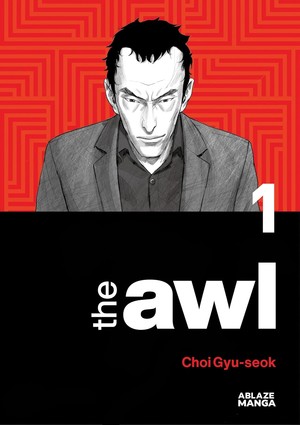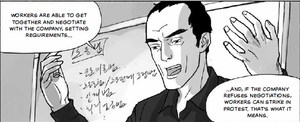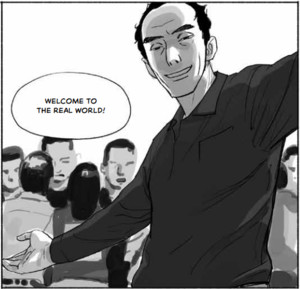The Fall 2024 K-Comics Guide
The Awl
What's It About?

Set in the latter half of the 2000s, against the backdrop of “Pureumi”, a fictional superstore chain in South Korea, the work unfolds with a focus on two protagonists: Yi Su-in, who has been instructed by the corporation to dismiss workers unjustly; and Gu Go-sin, a labor activist.
A man of principles, Su-in is someone who cannot restrain outspoken criticism and is constantly at odds with the world. Though he has quit a career in the armed forces to live quietly and chosen an ordinary job, he once again clashes against the world because the company has ordered him to drive out employees by force.
Aiding Su-in is Go-sin, a cool-headed and deft labor activist who runs a labor counseling center near the Pureumi chain. Unlike Su-in, who has difficulty getting along with people and sternly sticks to rules, he approaches others without hesitation and even resorts to extreme measures at times to accomplish goals.
Together, Su-in and Go-sin will oppose the manipulation and moral harassment to which the employees are cynically subjected. The process through which these two figures remind ordinary, diligent workers of their rights and bring change together will fire up readers.
The Awl has story and art by Choi Gyu-seok, with English translation and lettering by Lynn Eskow. Published by ABLAZE (September 24, 2024).
Is It Worth Reading?

Rebecca Silverman
Rating:
If you've ever worked for a shady company or had to fight for your rights as a worker, this one's for you. Unlike most of the manhwa currently getting an English translation, Ablaze's release of The Awl is utterly devoid of color and fantasy. Drawn in shades of grey in more than one sense, the story follows Soo-In Lee, a disillusioned company man who has spent his life trying to stand up against injustice only to be rebuffed every single time. From his school days to his time in the military, where he rose to the rank of captain, Soo-In has tried to fight the good fight, with very mixed results that often left him feeling like he made no difference at all. After mustering out, he joins a French grocery store chain in hopes of finding something better, only to have his boss smilingly tell him to make sure that all of the employees in his department feel obliged to quit. To say that this doesn't sit well with Soo-In is an understatement.
But what can he do? As the volume unfolds, we come to realize that South Korean labor laws aren't something that most workers seem to be aware of, and Soo-In's attempts to join a union and work towards the betterment of his workers and his own job are neither easy nor looked kindly upon. It's frustrating, because we can recognize the exact same situations playing out on the page as the ones that led up to things like the Triangle Shirtwaist Factory fire in 1911 New York City and children getting pulled into mechanical looms by their hair during the Industrial Revolution. Soo-In's drive puts him in the path of labor lawyer Go-Shin Gu, whose presence forms the backbone of the story as he tries to educate workers about their rights, and with Gu's help, Soo-In seems to be on track for learning that he does have power, even if the bosses don't want to acknowledge it.
This isn't an easy read, and it's not intended to be. There's mild violence, but the real pain here comes from the way that people in power use that power to stamp out unions and the little guy. They don't give a shit about anything but their own bottom line, and some of them – along with people like Gu or the employees in Soo-In's department – question why a manager would even be on the workers' side in the first place. He's fighting against the system on several levels, and it's not going to be an easy battle. It's one that needs to happen, and to keep happening, though. It's not just garment factories or other stereotypical workplaces where this is a problem, and if you want to get good and angry about it or just feel passionately about workers' rights, The Awl is a good place to start reading.
Is It Worth Reading?

Christopher Farris
Rating:
The Awl feels unlike virtually anything else I've covered in these guides and reviews, and that's not simply down to it being a manhwa instead of a manga. Choi Gyu-seok's account of workers rising up against the man is more an informational manifesto than it is a period-piece tale of mid-2000's movements. The pacing regularly feels like it's pausing so that characters (primarily labor counseling deuteragonist Go-shin Gu) can recite details about Korean labor laws and the employment conditions that necessitate them. Most of the actual "story" is skeletal structure facilitating that, and while it can hardly be called "dry", it's still plainly direct in its purpose. Sorry to Bother You this is not.
That means that as a book in search of an audience, The Awl may miss readers coming into this for anything resembling pure storytelling. It's not just that the material covered in this manhwa can feel depressingly real a lot of the time, though to be sure, that's part of it. Things like a harrowing depiction of a real-world-style work protest/riot are there to make an impact on the audience as they are to impart the truth of the struggle to somewhat naive lead character Soo-in Lee. It's a story where distressing statistics and historical accounts can be rattled off in- universe with no citation technically needed. It does make this volume a solid jumping-off point if one wants to pursue further reading on these subjects relevant not just to Korea but to the universal lived experience of workers struggling for rights. But in the moment it can feel like a dense lecture by talking heads more than even the most sociologically meaningful graphic novel.
All those caveats only speak to the unique meaningfulness of The Awl, though. For all its detailed debating, it's still a book that profoundly understands the living horror of a modern society where the only thing someone fears more than death is losing their job. In its moments of indulging genuine emotion, it captures the internally screaming rage that motivates us to strive for something better—in Lee's tunnel-vision POV in the wake of his superior dragging him, you can hear the ear-ringing resonance of his mental struggles. Choi Gyu-seok can drop salient lines as often as dissertations on worker rights, capturing the spirit of, if not winning, doing a little bit better every time. If some of the art is murky or over-reliant on photo-referenced backgrounds, it still lends The Awl the kind of scrappy energy that complements how it says its piece. It's imperfect, it might not entertain you in the way you hope for, you might not even agree with anything it has to say. But all that is what makes it a look in the first place.
back to The Fall 2024 K-Comics Guide
Seasonal homepage / archives